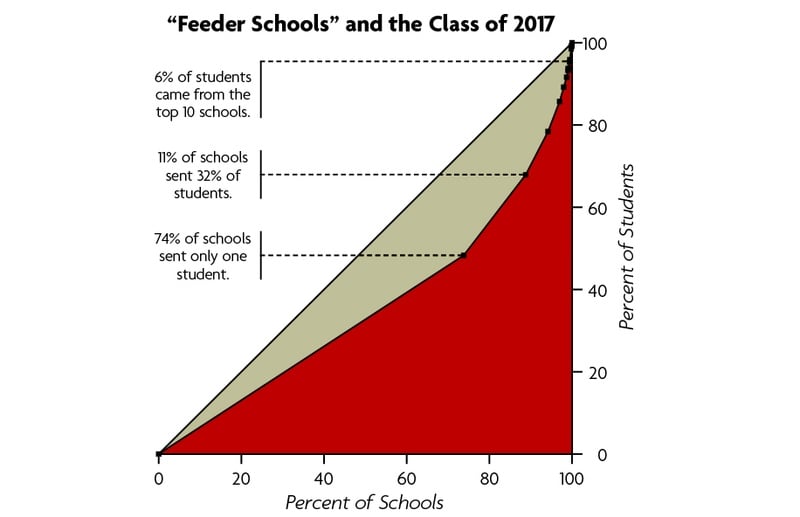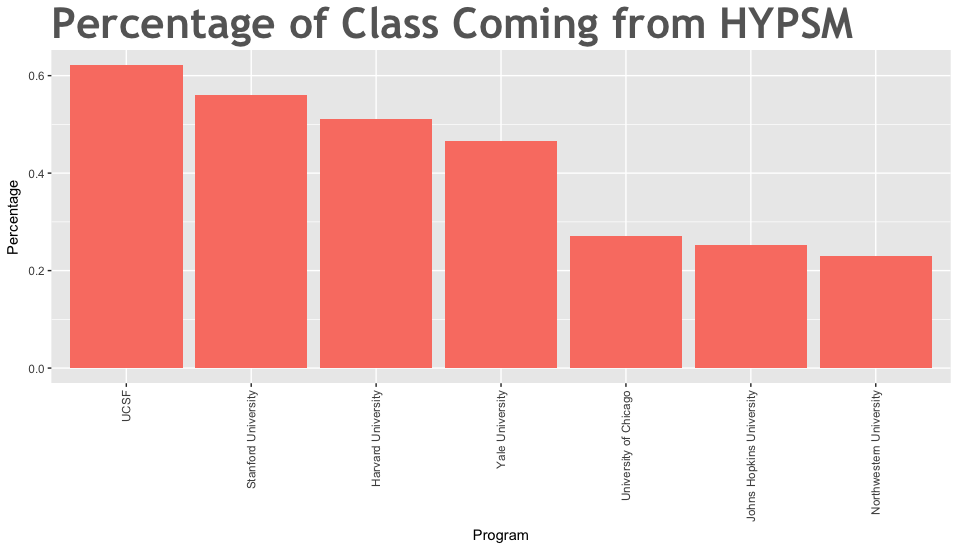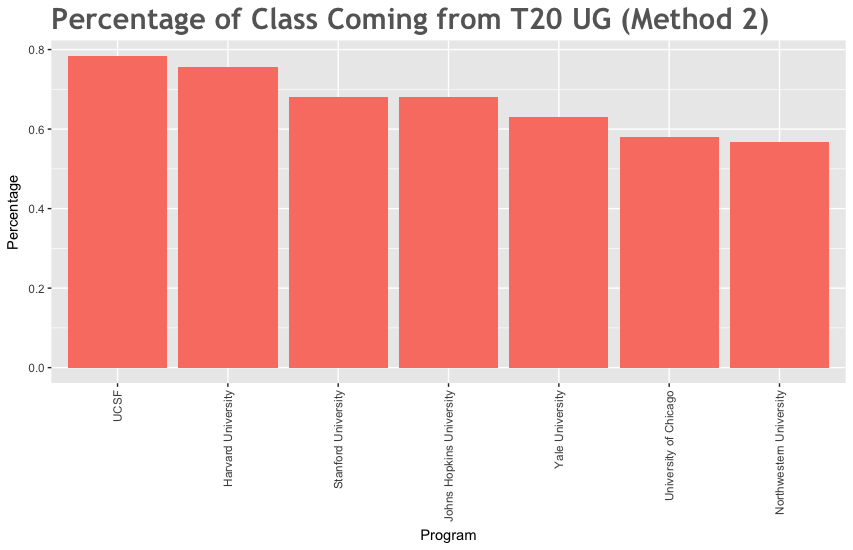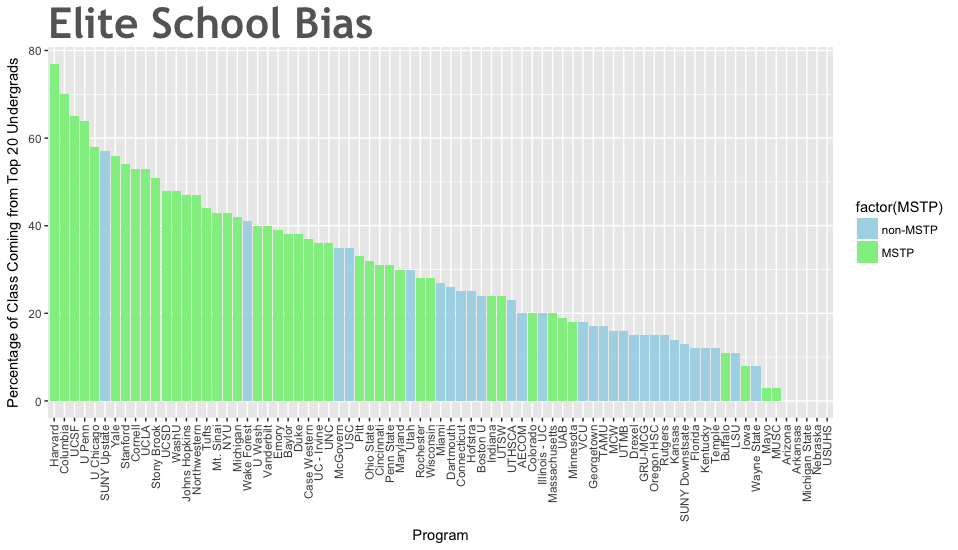Median GPAs at med schools would suggest otherwise. What I'm saying is school name counts when you have high stats.
how much though? i.e does someone who's orm from a state school with good ecs have a shot
Sent from my iPhone using SDN mobile
Median GPAs at med schools would suggest otherwise. What I'm saying is school name counts when you have high stats.
Yes.how much though? i.e does someone who's orm from a state school with good ecs have a shot
Sent from my iPhone using SDN mobile
I realize that but that doesn't tell the whole story. For one thing, people mix up the terms scholarships and grants all the time. So, saying that a student received 80-100% scholarship to school X wouldn't necessarily tell the adcoms that most or all of that aid was merit based or need-based. And, it wouldn't tell the adcoms that the student had to choose that school because his family couldn't afford Columbia where he was also accepted, but without much or any aid.
It's a phenomenon on paper that schools don't discriminate on UG institutions. I bet at the very least, there is a unconscious bias from adcoms on UG schools. But the schools that do strongly unconsciously or consciously discriminate on UG are more than likely t20s or t10s so it doesn't even apply to most of the applicant pool anyways.
PS I go to a local state school so not sure what you're all perked up about @PreMedMissteps. I speak the truth. State schools might as well be party schools that accept anyone who gave half an effort in high school.
Besides, aren't you URM? You should be fine going to a state school (hell, even DeVry) unlike me who will have to do exceptional for even a second glance.
Adcoms like LizzyM have said in the past that they can put 2 and 2 together about choosing one school over another due to scholarships. Also, as I mentioned before, you can specify the merit scholarship in the Awards section.
Eh, you can pretty safely infer that if someone is rocking a high LizzyM out of an unknown school and they paid for it mostly with merit award, they could have gone somewhere well known, though sure you can't know the specific names they turned down. Merit awards are for recruitment after all. You don't throw your full rides at kids that would be similar to a typical admit. You use that money to pull in the top 20 candidates that would otherwise not matriculate to you.Yes you can specify merit scholarships in the awards section, but an adcom can't then infer that this student was also accepted to JHU, Columbia, Harvard or wherever, because nothing indicates that the student ever applied to those schools. The best an adcom can infer is that the student was chasing merit, either because family couldn't afford a pricier school, or the student is saving his college fund or parent contribution for med school.
Eh, you can pretty safely infer that if someone is rocking a high LizzyM out of an unknown school and they paid for it mostly with merit award, they could have gone somewhere well known, though sure you can't know the specific names they turned down. Merit awards are for recruitment after all. You don't throw your full rides at kids that would be similar to a typical admit. You use that money to pull in the top 20 candidates that would otherwise not matriculate to you.
I don't think the idea is that they now view the GPA the same as if it was earned against the competition at a Hopkins or Cornell type undergrad. It's just that the adcom has a moment of wondering "Why is this 80 LizzyM attending a flyover public school?" and seeing that merit $$ makes them go "oh, because money"Absolutely. The lower ranked (not necessarily unknown) schools are poaching with merit. The recipients' test scores and GPAs are usually well-within that upper quartile of the school for and/or are NMFs being awarded the college's big NMF pkg.
So an adcom who sees that Student X went to Oklahoma and lists being a NMF and NMF merit award recipient, yes they can conclude that this was a top high school student chasing merit. Are people suggesting that that student then gets viewed as if he went to a top undergrad?
Also many U of Flyover State students that do make top scores on the MCAT just don't care to pursue the top programs in the nation. Why worry about all of the extra financial strain and personal stress that comes with pursuing a top 20 when MD=MD and all you want to do is practice in your own state anyway? I have known several kids who scored 512+ on the MCAT and the only school they applied to is U of Oklahoma (median 507) because their dream career is to go to school and practice in the same area that all of their friends and family live. For the same reason you see many applicants posting about how they absolutely don't want to go to school in Omaha or Iowa City of Hannover, kids here don't want to go to school in NYC, Baltimore, Boston, or Philadelphia.I don't think the idea is that they now view the GPA the same as if it was earned against the competition at a Hopkins or Cornell type undergrad. It's just that the adcom has a moment of wondering "Why is this 80 LizzyM attending a flyover public school?" and seeing that merit $$ makes them go "oh, because money"
Again though, I think SDN overhypes the amount of bias one way or the other. The reason U of Flyover State grads are rare at Hopkins or Harvard or Penn is because UFS grads rarely hit top couple percent on the MCAT, imo. The handful of SDN peeps that had fantastic scores coming from various public programs (like gettheleadout, or narmerguy, or elcapone) all landed top 10 admits. It's largely just that top MD level apps are more common at the top undergrads.
Also many U of Flyover State students that do make top scores on the MCAT just don't care to pursue the top programs in the nation. Why worry about all of the extra financial strain and personal stress that comes with pursuing a top 20 when MD=MD and all you want to do is practice in your own state anyway? I have known several kids who scored 512+ on the MCAT and the only school they applied to is U of Oklahoma (median 507) because their dream career is to go to school and practice in the same area that all of their friends and family live. For the same reason you see many applicants posting about how they absolutely don't want to go to school in Omaha or Iowa City of Hannover, kids here don't want to go to school in NYC, Baltimore, Boston, or Philadelphia.
EDIT: I personally am gunning for Duke or Mayo, but I still very much understand the thought process of my peers and I myself will most likely eventually return to practice in OK no matter where I go to school.
Undergrad name matters to some med schools far more than others. See link in my signature to AAMC survey, where private med schools rated undergrad selectivity as highly important.
they are competing against students who are just as smart if not smarter and twice as driven
Cesspool state schools? Really?
Moving on....you're forgetting that med schools want diversity and that's not just ethnic diversity. A top med seating only applicants from top 10-20 colleges wouldn't probably end up with a very diverse group.
There's a reason why Ivy colleges long moved away from the old way of their feeder prep schools sending them lists of who will be matriculating at their schools. The top meds don't want that situation either.




It matters. You're better off with a 3.5 from Harvard than a 3.95 from a no-name state school. These returns slowly diminish outside of the top 10 through the top 20, then rapidly diminish thereafter.Hey guys! I've looked around for some opinions about this topic but haven't been able to find too many thoughts.
I will be graduating from an ivy league school this year, which is known to be very hard and to grade deflate. I was wondering if this has any impact during the application cycle. Do medical schools take into account the rigor of some schools versus others and the fact that some schools deflate grades more than others? For instance, all else being equal, would a 3.6 from my university be equated to say, a 3.8 from a state school in ADCOM's eyes? Or do they purely care about a higher number? I would have to imagine it matters at least a little but do correct me if I'm wrong. Any thoughts appreciated as I expect this will impact where I end up applying!
32% of Harvard freshmen come from 11% of high schools while 78% of high schools only send one kid. That is a HUGE bias.If I'm reading the above correctly from a small tablet and no glasses, it still appears that at least 68% of Harvard's freshman class came from non-feeder schools...presumably here and there across the nation.
The MSTP students, first of all, are a rather small cohort, comparatively, and are generally an elite group all by themselves. No surprise that most might come from top undergrads, for a variety of reasons, including the likelihood that their could be better advising/support for a prospective MD/PhD
Many rank and file premeds have never even heard of MD/PhD MSTP, at least not early enough for them to have adequately prepared to be a viable candidate.
Furthermore, I'm not sure that the same "personality and diversity expectations" exist for MD/PhD students as there would be for simply MD. It matters more to the general population that the doctors that they're more likely to see be a more diverse group...ethnically, geographically, personal backgrounds, etc.
If I'm reading the above correctly from a small tablet and no glasses, it still appears that at least 68% of Harvard's freshman class came from non-feeder schools...presumably here and there across the nation.
The MSTP students, first of all, are a rather small cohort, comparatively, and are generally an elite group all by themselves. No surprise that most might come from top undergrads, for a variety of reasons, including the likelihood that their could be better advising/support for a prospective MD/PhD
Many rank and file premeds have never even heard of MD/PhD MSTP, at least not early enough for them to have adequately prepared to be a viable candidate.
Furthermore, I'm not sure that the same "personality and diversity expectations" exist for MD/PhD students as there would be for simply MD. It matters more to the general population that the doctors that they're more likely to see be a more diverse group...ethnically, geographically, personal backgrounds, etc.
That's what I said too. t10-t20s are the schools that care more about ivy UGs. That is not to say that other schools don't care about UG at all either.It matters. You're better off with a 3.5 from Harvard than a 3.95 from a no-name state school. These returns slowly diminish outside of the top 10 through the top 20, then rapidly diminish thereafter.
That's what I said too. t10-t20s are the schools that care more about ivy UGs. That is not to say that other schools don't care about UG at all either.
Honestly if you get a 3.5 at an Ivy and do average on the MCAT, I'm sure some adcoms will recognize that you have the name-brand quality; compared to Joe Blow who got a 3.9 at a state school.
Who wouldn't want to interview someone who want to HYP? @DBC03
I meant the other way around- top undergrads matter, but only the highest level undergraduate degrees offer a great benefit. Outside of about the best twenty or so UGs, there isn't a lot of advantage and it will come down more to your record and what program you attended within your given school more than your degree itself.That's what I said too. t10-t20s are the schools that care more about ivy UGs. That is not to say that other schools don't care about UG at all either.
Honestly if you get a 3.5 at an Ivy and do average on the MCAT, I'm sure some adcoms will recognize that you have the name-brand quality; compared to Joe Blow who got a 3.9 at a state school.
Who wouldn't want to interview someone who want to HYP? @DBC03
Fair enough, I agree.I meant the other way around- top undergrads matter, but only the highest level undergraduate degrees offer a great benefit. Outside of about the best twenty or so UGs, there isn't a lot of advantage and it will come down more to your record and what program you attended within your given school more than your degree itself.
All medical schools value prestigious degree holders to some extent.
Interesting. Thanks for the perspective. I was thinking along the lines of a rockstar (HYP grad) in a small town (not t20 school). Or as @Goro said, a well known product.As a HYP Grad, I can confirm that quite a few friends who were able to get into Duke, Harvard, and/or Stanford with average GPAs (3.5) and unspectacular MCAT scores had a very difficult time getting into Florida schools. We're talking no interviews at places like USF or UF (Depending on the person). So it appears that while elite private med schools may take pedigree into account (and may have a track record of admitting HYP students with average GPAs that do quite well in med school), many state schools couldn't care less and will interview the 3.9 UState grad before the 3.5 HYP grad.
This is my guess and n<10, so it's not exactly a scientific observation.
As a HYP Grad, I can confirm that quite a few friends who were able to get into Duke, Harvard, and/or Stanford with average GPAs (3.5) and unspectacular MCAT scores had a very difficult time getting into Florida schools. We're talking no interviews at places like USF or UF (Depending on the person). So it appears that while elite private med schools may take pedigree into account (and may have a track record of admitting HYP students with average GPAs that do quite well in med school), many state schools couldn't care less and will interview the 3.9 UState grad before the 3.5 HYP grad.
As a HYP Grad, I can confirm that quite a few friends who were able to get into Duke, Harvard, and/or Stanford with average GPAs (3.5) and unspectacular MCAT scores had a very difficult time getting into Florida schools. We're talking no interviews at places like USF or UF (Depending on the person). So it appears that while elite private med schools may take pedigree into account (and may have a track record of admitting HYP students with average GPAs that do quite well in med school), many state schools couldn't care less and will interview the 3.9 UState grad before the 3.5 HYP grad.
This is my guess and n<10, so it's not exactly a scientific observation.
Hah, TIL the bottom 10% GPAs at the top med schools aren't always nontrads or URMs, they might just be Princeton or MIT grads instead.My experience as well.
Isn't WashU known for a top notch pre med program? I'm surprised they don't get the same boost- it's almost like that boost only exists for IVY undergrads, not just any top school ( so not UNC , top LAC's , UMich,Berkley). Even on these fora people applying from Ivy League seem to have more success than people from non-IVY top schools. Hm.Hah, TIL the bottom 10% GPAs at the top med schools aren't always nontrads or URMs, they might just be Princeton or MIT grads instead.
Obvs WashU isn't at HYPSM status but I haven't known any 3.5s with unremarkable MCATs scoring t10 admits
 I guess to have a lower GPA from a non Ivy you need a strong MCAT.
I guess to have a lower GPA from a non Ivy you need a strong MCAT.I just think you're UGrad name shouldn't be an insurmountable barrier- a lot of people aren't as studious in HS because they didn't even know they wanted to be a docs, and I just don't think that should follow them for the rest of their careers, you know? I think the same for people who screw up the first year or two of college.
Also, grade trends being as important as UGrad GPA is something I agree with. You need to show you can handle med school, but also that you can adapt when things get harder.
Disclaimer- I've always wanted to be a doc but ended up at a mid-tier state school, so you know. Just my two cents.
Hah, TIL the bottom 10% GPAs at the top med schools aren't always nontrads or URMs, they might just be Princeton or MIT grads instead.
Obvs WashU isn't at HYPSM status but I haven't known any 3.5s with unremarkable MCATs scoring t10 admits
I think it's kind of bullsh*t to give more weight to a GPA just because it's from a more "well-regarded" institution. One of my friends from an Ivy that is known for deflation took a class at my state school over the summer (our summer terms are the same length as a regular semester) and said it was much harder than any of the prereqs he had taken at his institution. High GPAs show not only good work ethic, but also good judgement (in knowing what you can handle).
Hmm. I have been under the impression that top schools, excluding a few, are known to inflate grades.
Sent from my SM-G950U using Tapatalk
Hmm. I have been under the impression that top schools, excluding a few, are known to inflate grades.
Sent from my SM-G950U using Tapatalk
I don't know, and don't care. If you do well, whether you go to Harvard or Kutztown State, you're a competitive candidate for medical school. Harvard and the other Big Name UG schools are known feeders for Top Schools. Their med school grads go into Top Residencies. This is nothing new.(calling @efle and @Goro and @Lucca, in particular, for help!)
since I'm procrastinating on secondaries- I want to get some cold data behind some of the speculation
I'm using AAMC's Table A-23 for 2016-2017, USNews 2018 (h/t reddit), and the grids from Harvard & Yale. (If anyone at Princeton/Stanford has similar data, hit me up. For now, from what I've seen on their website, I'll treat it as equivalent to HY)
With similar stats (GPA+MCAT), do HYPS grads get accepted by a med school (anywhere) at a higher rate than other applicants?
The average Yale and Harvard med school applicant has a ~3.6 and ~515.
This doesn't take into account ECs and other factors obviously, but from the AAMC table, the average HY applicant with a 3.6/515 is accepted at a rate comparable to a national applicant with a >3.79/515, suggesting that HYPS may be equivalent to a ~0.1-0.2 boost in GPA. I don't think the average HYPS applicant is applying to schools that are less selective than other applicants.
- National - acceptance rate for 3.6/515 is ~76%
- Yale - acceptance rate is 83-86%
- Harvard - acceptance rate is 88-94%
And this is just one top school, but here are some of the undergrad school-specific interview and acceptance rates at U Michigan:
Interview Rate (Interviews/Applications):
Interview to Acceptance (Acceptances/Interviews):
- Harvard: 26%
- Yale: n.a.
- Stanford: 21%
- UMichigan: 18%
- WUSTL: 17%
- Duke: 13%
- UC Berkeley: 9%
- All Applicants at Michigan: 9%
- Harvard: 83%
- Yale: 76%
- Stanford: 75%
- All Interviewees: 72%
- Duke: 71%
- UC Berkeley: 70%
Overall, this seems to confirm what many people on here say: the main issue is getting to the interview. There may be a modest benefit to undergrad name at a top-tier school (equivalent to a ~0.1-0.2 GPA boost) and at one medical school, HYPS applicants get II at rates nearly 3X the overall average and >2X the rate of applicants from other "top" schools like Duke and Berkeley.
But this advantage seems to be attenuated once at the interview stage.
Let me know what you guys think. Why do you think this is? And anyone know of similar *undergrad-specific* interview/acceptance data for other schools?
The Top Schools have their pick of the 3.7+ Harvard etc students. They can afford to turn down 3.4 Harvard students.
So true, and SDNers are also advised to not think that stats are the only thing that matter.Exactly - one student goes to Harvard, tries hard, gets a 3.4 GPA. Come med school admissions, he whines, "But I went to Hahhhvvaaddd..." The correct response is: "Yeah, well other applicants also went to Harvard and managed to pull off a 3.8 GPA." You're not getting the A but somebody is. But then again, the caveat is that GPA only matters up to a point for the top schools. HMS isn't going to reject someone with a 3.5 and 520 MCAT just because they have a 3.5. That statement shouldn't be taken too far though - it also doesn't mean that somebody with a 3.5 and 520 starts on the same rung of the ladder as someone with a 3.8 and 520. It just means that there's more to make up for - but making up is possible.
Dude you have to be pretty ****ing special to get HMS love with a 3.5, that's like a quarter point beneath the 10th percentile markHMS isn't going to reject someone with a 3.5 and 520 MCAT just because they have a 3.5
Link?According to their website, 1/3 of successful Princeton premeds go to top 10 schools.
Link?
Dude you have to be pretty ****ing special to get HMS love with a 3.5, that's like a quarter point beneath the 10th percentile mark
...as far as you/he knows. Could have been that with typical numbers he'd have been an admit, and it really is true that a 3.5 is what kept him out of HMSDidn't end up getting in, but that had more to do with the interview than the stats.
...as far as you/he knows. Could have been that with typical numbers he'd have been an admit, and it really is true that a 3.5 is what kept him out of HMS
